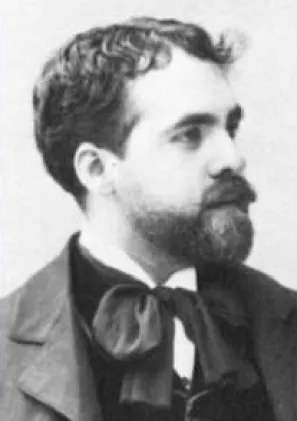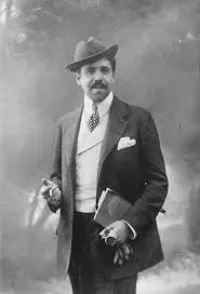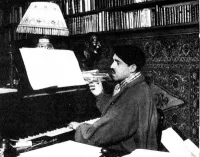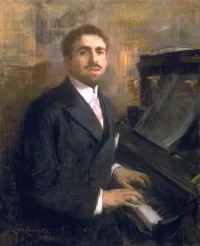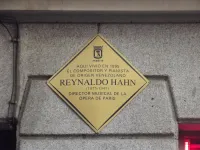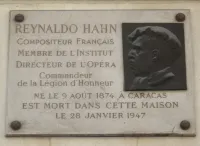Biography
1874 - 1947
“Rhythm is the pulse of music and its secret heartbeat.”
– Reynaldo Hahn from his book On Singers and Singing
When he was 3 years old, the family of Reynaldo Hahn fled political unrest in Venezuela and relocated to Paris. Recognized as a child prodigy, he made his musical debut playing piano and singing in the salon of Napoleon Bonaparte’s niece. By the age of 8 he was composing songs. At age 10 he entered the Paris Conservatoire and wrote the popular song ‘Si mes vers avaient des ailes’ at 13. Though Hahn constructed melodies in the classic French style, he also wrote chamber music (2 string quartets and a piano quintet), orchestral music (concertos for piano and violin), as well as operettas (‘L’ile du Reve’ and the acclaimed ‘Ciboulette’), operas (‘Le Marchand de Venise’), and even ballets (‘La Fete Chez Therese’ and ‘Le Dieu Bleu’). He also set the work of Velaine to music. His best known pieces include ‘Chansons grises’ and ‘D’une prison.’ As a conductor, he specialized in Mozart and, starting in 1934, he began his longtime post as music critic of the daily French newspaper Le Figaro. His memoirs are valuable resources for the musical and literary world of Paris which, at the time, boasted the talents of Sergei Diaghilev, Jean Cocteau, and Sarah Bernhardt among others. For 2 years he was romantically involved with the 22 year-old Marcel Proust and wrote a piano suite about their relationship. It was Proust’s first love affair and when it ended he abandoned the now-famously unfinished novel, Jean Santeuil, whose protagonist was based on Hahn. Hahn left Paris in 1940 during the Nazi occupation and returned in 1945 to become director of The Paris Opera. He died in 1947 in Paris, the city he loved. He was 72.
1874 - 1947
“Rhythm is the pulse of music and its secret heartbeat.”
– Reynaldo Hahn from his book On Singers and Singing
When he was 3 years old, the family of Reynaldo Hahn fled political unrest in Venezuela and relocated to Paris. Recognized as a child prodigy, he made his musical debut playing piano and singing in the salon of Napoleon Bonaparte’s niece. By the age of 8 he was composing songs. At age 10 he entered the Paris Conservatoire and wrote the popular song ‘Si mes vers avaient des ailes’ at 13. Though Hahn constructed melodies in the classic French style, he also wrote chamber music (2 string quartets and a piano quintet), orchestral music (concertos for piano and violin), as well as operettas (‘L’ile du Reve’ and the acclaimed ‘Ciboulette’), operas (‘Le Marchand de Venise’), and even ballets (‘La Fete Chez Therese’ and ‘Le Dieu Bleu’). He also set the work of Velaine to music. His best known pieces include ‘Chansons grises’ and ‘D’une prison.’ As a conductor, he specialized in Mozart and, starting in 1934, he began his longtime post as music critic of the daily French newspaper Le Figaro. His memoirs are valuable resources for the musical and literary world of Paris which, at the time, boasted the talents of Sergei Diaghilev, Jean Cocteau, and Sarah Bernhardt among others. For 2 years he was romantically involved with the 22 year-old Marcel Proust and wrote a piano suite about their relationship. It was Proust’s first love affair and when it ended he abandoned the now-famously unfinished novel, Jean Santeuil, whose protagonist was based on Hahn. Hahn left Paris in 1940 during the Nazi occupation and returned in 1945 to become director of The Paris Opera. He died in 1947 in Paris, the city he loved. He was 72.
Demography
Demography
Gender Male
Sexual Orientation Gay
Gender Identity Cisgender
Ethnicity Jewish Latinx
Faith Construct Judaic
Nations Affiliated Venezuela France
Era/Epoch Interwar Period (1918-1939) Progressive Era (1890-1920) Roaring Twenties (1920-1929) World War I (1914-1918)
Field(s) of Contribution
Author
Journalism
Military
Music
Theater
Commemorations & Honors
Plaque Commemorating Hahn at 7 Rue Greffulhe in Paris
Demography
Gender Male
Sexual Orientation Gay
Gender Identity Cisgender
Ethnicity Jewish Latinx
Faith Construct Judaic
Nations Affiliated Venezuela France
Era/Epoch Interwar Period (1918-1939) Progressive Era (1890-1920) Roaring Twenties (1920-1929) World War I (1914-1918)
Field(s) of Contribution
Author
Journalism
Military
Music
Theater
Commemorations & Honors
Plaque Commemorating Hahn at 7 Rue Greffulhe in Paris
Resources
Resources
Resources
